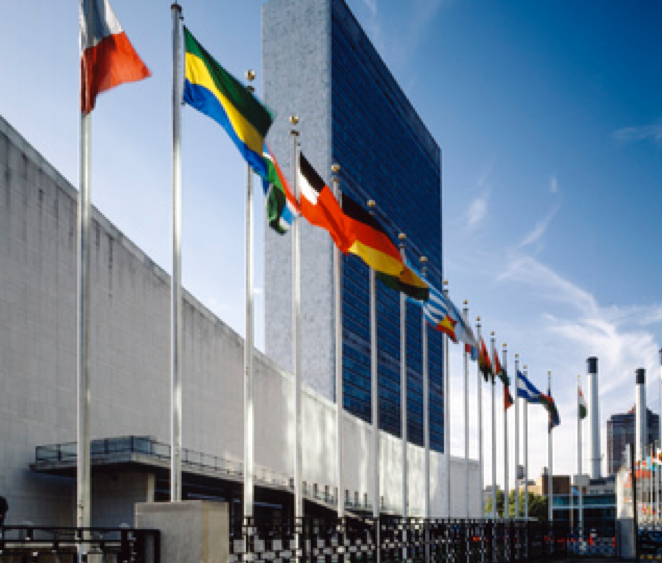Posted on 8 November 2019 by Tanya Andersson Nystedt
The views expressed in this publication are those of the authors and do not necessarily represent those of the Agenda 2030 Graduate School or Lund University. The present document is being issued without formal editing.
On the 24-25th September 2019 the United Nations High Level Political Forum convened for the first follow-up on progress towards the Sustainable Development Goals (SDGs). It was a week during which we watched young people around the world demonstrate on climate change juxtaposed against world leaders making long meandering statements promising very little and definitely nothing approaching the systemic transformation that research indicates that delivering the 2030 Agenda would call for. It was also a week which held the UN High Level Meeting on Universal Health Coverage which went mostly unnoticed by those not already engaged with the issues of global health. Universal Health Coverage (UHC) is the idea that everyone everywhere should have access to quality affordable health care without having to suffer financial hardship in paying for it. The outcome of the High Level Meeting was the Political Declaration on Universal Health Coverage which was hailed by the UN Secretary General as the ““most comprehensive agreement ever reached on global health” and the Director General of the World Health Organisation (WHO) called it “a landmark for global health and development”. But what does this process and this outcome document in fact say about our goals and aspirations as well as how we plan to go about fulfilling them?
Where we are
If the meeting and political declaration got little attention, the UHC 2019 Monitoring Report got even less. It, like the UN Secretary General’s Progress Report on the SDGs, shows that in most areas we are off track. That progress has, at best, slowed and in many cases has plateaued, or is even reversing. More than 50% of the world’s population does not have access to essential health services and at this rate of progress more than 1/3 will remain uncovered in 2030. Some estimates put this number at 5 billion people without access to health care services in 2030 if current trends continue. There is wide-spread inequity and inequality and there are more people without financial protection than ever before, meaning that the number of people facing catastrophic health costs is on the rise.
What we needed from this High Level Meeting was a road-map of how we are going to address this reality, reverse these trends, and how we are going to achieve the goal good health and well-being for all by 2030. This is not what we got. Instead we got politics as usual. Hungary which was set to co-host the meeting jumped off when they realised that “Universal” health coverage might include health services for “illegal” migrants and refugees (“migration is not a right”). The United States advocated to remove any mention of Sexual and Reproductive Health (SRH) and Reproductive Rights entirely from the declaration conflating it with abortion services despite that abortion is not mentioned at all (“there is not right to abortion”). They were joined by 18 countries, however, thanks to the strong opposition from 58 other countries it failed and was included in the political declaration. The final result, was that the United States “distanced themselves” from the relevant section (paragraph 68). One can ask what the value of a political declaration is when the countries are not in agreement with either its principles (universality) or its content (SRH). One can also ask how excluding migrants and attacking SRHR (Sexual and Reproductive Health and Rights), which has been argued to be some of the most cost-effective interventions for improving the health and well-being, in particular of rural women in Low and Middle Income Countries, is in keeping with the ideal of leaving no one behind. Contrary to both the ideal of leaving no one behind and universality, those left behind are still being left behind.
In fact, the whole discourse of UHC has moved from one of health as a human right to a focus on service provision and then mostly on curative services with a focus on primary healthcare provision, with little mention on promotive, preventive, palliative or rehabilitative services. In fact, there is no agreement on minimum standards, instead the focus is on “nationally determined” sets of services. Countries need to take into account competing health priorities, such as provision of SRH services for rural women or non-communicable disease services required by urban middle-classes. This, in a context of decreased development assistance for health due to competition with other urgent development priorities, such as climate change. Even within this narrowed scope of what is meant by UHC, the financing the WHO calls for is insufficient to achieve it by 2030. This means that even if funding targets are met, the goal of UHC will not be.
Over the past 40 years we have moved from the aspirations of Alma Ata declaration of 1978 calling for “good health for all” by 2000, to aiming for “selective health service provision for some” by 2030, and trying to convince ourselves that this is progress.
—
Tanya Andersson Nystedt is a PhD candidate within the Agenda 2030 Graduate School and at the Department of Clinical Sciences at Lund University.

